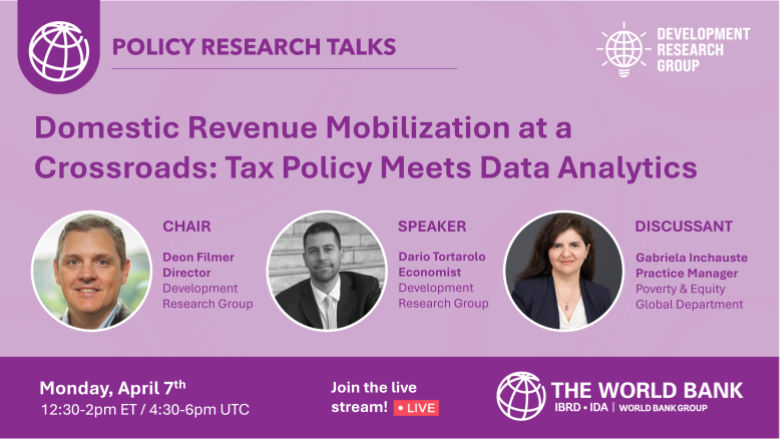Located within the Development Economics Vice Presidency, the Development Research Group is the World Bank's principal research department. With its cross-cutting expertise on a broad range of topics and countries, the department is one of the most influential centers of development research in the world.
The Development Research Group at a Glance
What's New

The inaugural edition of the International Seminar on Trade (ISoT) will focuse on recent advances in empirical, theoretical, and quantitative international trade.?The event is jointly organized by the Journal of International Economics,?Banque de France,?Centre for Economic Policy Research (CEPR),?World Bank, and?University of Surrey. The keynote lecture will be delivered by , Warren Alpert Professor at the Harvard Business School.
To join the inaugural event, tune in to the live stream on May 5-6, 2025.?

A new report from the World Bank Group,?,?explores the surge in capital market financing in low- and middle-income countries from 1990 to 2022. Drawing on data from nearly 80,000 firms worldwide, the study shows how capital markets have been a key driver of investment and job creation in developing countries.
The accompanying ?enables users to compare capital market financing at country, regional, or income levels against selected benchmarks through dynamic graphs and maps.

In many developing countries, tax policy is often driven more by pragmatism rather than the pursuit of optimal outcomes. Barriers such as informality, low tax capacity, political roadblocks, and limited data analytics often result in inefficient and inequitable tax structures that persist over time.
On April 7, 2025,?Dario Tortarolo?discussed how new data-driven approaches are reshaping how governments design and evaluate tax systems in real time, enabling policymakers to move beyond educated guesses toward informed, evidence-based decisions.

Infrastructure has the potential to accelerate development by improving competitiveness in international markets, supporting businesses and industries, and enabling the efficient movement of goods, people, and ideas. But achieving these benefits will require addressing the challenges of inadequate investment, poor coordination, and weak governance.?Learn about the next-generation tools that are helping policy makers design better infrastructure policies and invest limited budgets strategically.








